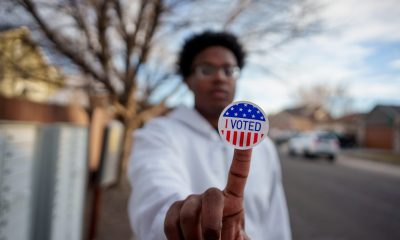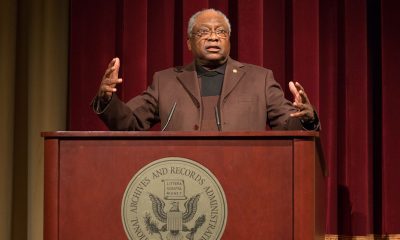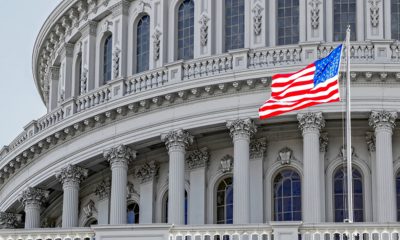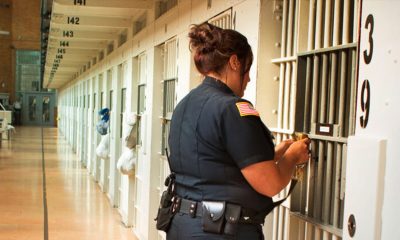Politics
Major Survey Finds Record Low Confidence in Government

In this Nov. 13, 2014 file photo, the Capitol Dome is surrounded by scaffolding for a long-term repair project, and the last of autumn’s colorful leaves frame the Capitol in Washington. (AP Photo/J. Scott Applewhite, File)
EMILY SWANSON, Associated Press
WASHINGTON (AP) — Americans’ confidence in all three branches of government is at or near record lows, according to a major survey that has measured attitudes on the subject for 40 years.
The 2014 General Social Survey finds only 23 percent of Americans have a great deal of confidence in the Supreme Court, 11 percent in the executive branch and 5 percent in Congress. By contrast, half have a great deal of confidence in the military.
The survey is conducted by the independent research organization NORC at the University of Chicago. Because of its long-running and comprehensive set of questions about the public, it is a highly regarded source of data about social trends. Data from the 2014 survey was released last week, and an analysis of its findings on confidence in institutions was conducted by The Associated Press-NORC Center for Public Affairs Research and the General Social Survey.
Five things to know about Americans’ low confidence in the government and other institutions:
___
DROP IN SUPPORT FOR PRESIDENCY DRIVEN BY REPUBLICANS
The 11 percent who say they’re confident in the presidency approaches a record low measured by the same survey in 1996, when just 10 percent said they had a great deal of confidence in the executive branch. The 44 percent who now say they have hardly any confidence at all is at a record high.
Historically, and not surprisingly, the survey has found that Democrats have more confidence in the executive branch when the sitting president is a Democrat, and Republicans have more confidence when the president is a Republican. In the 2014 survey, just 3 percent of Republicans say they have a lot of confidence in the presidency, down from a record high 45 percent who said so in 2002, when overall confidence in the presidency was also at the highest point the survey has measured, at 27 percent. Then, President George W. Bush was still riding a crest of support in the aftermath of the 9/11 terrorist attacks.
But confidence among Democrats has dropped some in recent years, too, from 25 percent in 2010 to 18 percent in 2014.
Just 1 in 10 independents expressed a lot of confidence in the presidency in 2014.
___
SUPREME COURT CONFIDENCE FALLING ACROSS PARTY LINES
The 2014 survey finds that confidence in the Supreme Court has fallen among Democrats, Republicans and independents since 2012, driving confidence in the court to a 40-year low overall. The 26 percent of Democrats with a lot of confidence in the court is a record low in the history of the survey, while Republican confidence in the high court, at 22 percent, is also near an all-time low.
Independents are the least likely to have a great deal of confidence in the court, at 20 percent.
Overall, 2 in 10 say they have hardly any confidence in the court, a record high, while more than half have only some confidence.
___
NOBODY LIKES CONGRESS
If there’s one issue than unites Americans, it’s that hardly anyone has much confidence in Congress, the survey shows. Over half of Americans express hardly any confidence at all, while only 7 percent of Democrats, 5 percent of independents and 3 percent of Republicans have a great deal of confidence in Congress.
Younger Americans — those under 35 — are a bit more likely than older ones to express confidence in Congress, but even among that group only 10 percent say they have a lot of confidence in the legislative branch.
___
POOR MARKS FOR MEDIA, TOO
Confidence has decreased since the 1970s, when about a quarter of Americans expressed a great deal of confidence in the press. Now, a record low of 7 percent have a lot of confidence, while 44 percent have hardly any confidence at all.
Republicans are the least likely to express a lot of confidence in the press, at only 3 percent, but Democrats aren’t far behind at 10 percent.
Only 1 in 10 has a lot of confidence in television, which is also near a record low.
___
FINANCIAL INSTITUTIONS REBOUND BUT STILL LOW
Americans’ confidence in banks and financial institutions reached an all-time low of 11 percent in 2010, but has rebounded slightly since then, with 15 percent now expressing a great deal of confidence. That’s still far from the survey’s all-time high of 42 percent in 1977.
Just 18 percent have a great deal of confidence in major companies, up a bit from 13 percent who said so in 2010 but down from 31 percent who said so in 1984.
Only 1 in 10 Americans has a lot of confidence in organized labor.
___
The General Social Survey is administered by NORC at the University of Chicago, with financing from the National Science Foundation, primarily using in-person interviewing. The GSS started in 1972 and completed its 30th round in 2014.
The typical sample size was 1,500 prior to 1994, but increased to 2,700-3,000 until 2008, and decreased to 2,000 for the most recent surveys. Resulting margins of error are between plus or minus 3.1 percentage points for the smaller sample sizes and plus or minus 2.2 percentage points for the larger sample sizes at the 95 percent confidence level. The 2014 survey was conducted March 31-Oct. 11, 2014, among 2,538 American adults. The GSS 1972-2014 Cumulative File was used to produce the statistics presented.
___
Online: http://www.apnorc.org
___
Follow Emily Swanson on Twitter at: http://twitter.com/EL_Swan
Copyright 2015 The Associated Press. All rights reserved. This material may not be published, broadcast, rewritten or redistributed.
Barbara Lee
Congresswoman Barbara Lee Issues Statement on Deaths of Humanitarian Aid Volunteers in Gaza
On April 2, a day after an Israeli airstrike erroneously killed seven employees of World Central Kitchen (WCK), a humanitarian organization delivering aid in the Gaza Strip, a statement was release by Rep. Barbara Lee (D-CA-12). “This is a devastating and avoidable tragedy. My prayers go to the families and loved ones of the selfless members of the World Central Kitchen team whose lives were lost,” said Lee.

By California Black Media
On April 2, a day after an Israeli airstrike erroneously killed seven employees of World Central Kitchen (WCK), a humanitarian organization delivering aid in the Gaza Strip, a statement was release by Rep. Barbara Lee (D-CA-12).
“This is a devastating and avoidable tragedy. My prayers go to the families and loved ones of the selfless members of the World Central Kitchen team whose lives were lost,” said Lee.
The same day, it was confirmed by the organization that the humanitarian aid volunteers were killed in a strike carried out by Israel Defense Forces (IDF). Prior to the incident, members of the team had been travelling in two armored vehicles marked with the WCF logo and they had been coordinating their movements with the IDF. The group had successfully delivered 10 tons of humanitarian food in a deconflicted zone when its convoy was struck.
“This is not only an attack against WCK. This is an attack on humanitarian organizations showing up in the direst situations where food is being used as a weapon of war. This is unforgivable,” said Erin Gore, chief executive officer of World Central Kitchen.
The seven victims included a U.S. citizen as well as others from Australia, Poland, the United Kingdom, Canada, and Palestine.
Lee has been a vocal advocate for a ceasefire in Gaza and has supported actions by President Joe Biden to airdrop humanitarian aid in the area.
“Far too many civilians have lost their lives as a result of Benjamin Netanyahu’s reprehensible military offensive. The U.S. must join with our allies and demand an immediate, permanent ceasefire – it’s long overdue,” Lee said.
Community
Financial Assistance Bill for Descendants of Enslaved Persons to Help Them Purchase, Own, or Maintain a Home
California Legislative Black Caucus (CLBC) vice chair Sen. Steven Bradford (D-Inglewood) introduced new legislation related to reparations to the Senate Committee on Housing on April 2 in Sacramento. Senate Bill (SB) 1007, “establishes the Homeowner’s Assistance for Descendants of Enslaved Persons Program to make financial aid or assistance available to descendants for the purposes of purchasing, owning, or maintaining a home,” the legislation states.
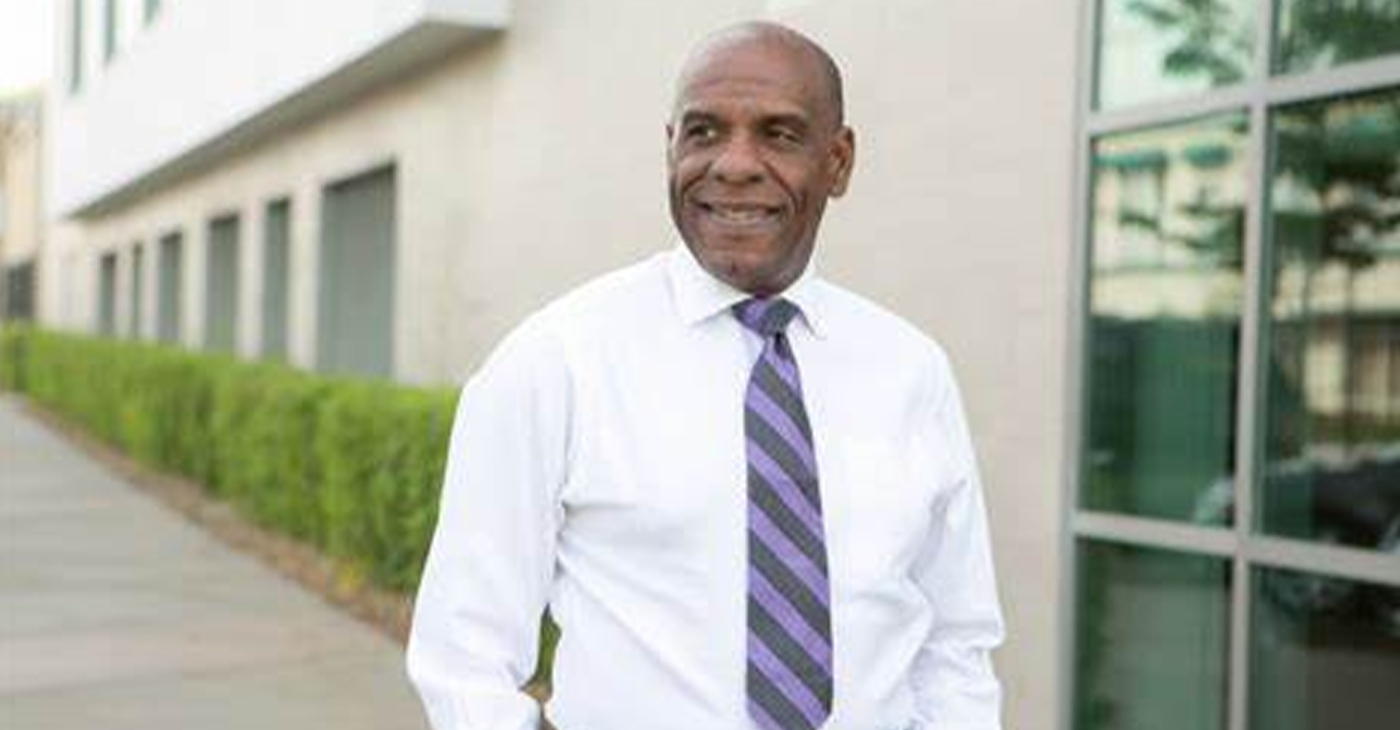
California Legislative Black Caucus (CLBC) vice chair Sen. Steven Bradford (D-Inglewood) introduced new legislation related to reparations to the Senate Committee on Housing on April 2 in Sacramento.
Senate Bill (SB) 1007, “establishes the Homeowner’s Assistance for Descendants of Enslaved Persons Program to make financial aid or assistance available to descendants for the purposes of purchasing, owning, or maintaining a home,” the legislation states.
The Senate Housing Committee advanced the bill with an 8-1 vote. It will be re-referred to the Appropriations Committee for consideration.
Sen. Kelly Seyarto (R-Murrieta) was the only member who voted against the bill.
“SB 1007 is about starting a long process of paying back a debt that is not only owed, but that was also promised, and is 160 years overdue, to African Americans,” Bradford told the committee chaired by Sen. Nancy Skinner (D-Berkeley). “It is the first step in closing the wealth and equity gap created by centuries of slavery and racial discrimination policies.”
The bill aligns with one of the 115 recommendations listed in a two-year study conducted by the California reparations task force, of which Bradford was one of nine members.
Bradford said the report reveals that, in the state of California, a typical Black-owned home is 22% less valuable than a White-owned home.
Various advocacy groups from around the state attended the hearing held at the State Capitol Annex Swing Space. The California Housing Partnership, Bay Area Regional Health and Inequities Initiative, Coalition for A Just and Equitable California, Disability Rights of California, the American Civil Liberties Union of California, and California Community Builders all voiced their support of the bill.
Community
AG Bonta Says Oakland School Leaders Should Comply with State Laws to Avoid ‘Disparate Harm’ When Closing or Merging Schools
California Attorney General Rob Bonta sent a letter this week to the Oakland Unified School District (OUSD) Board of Education saying the district has a duty to comply with state education and civil rights laws to protect students and families from “disparate harm,” such as segregation and discrimination, if the district goes ahead with school closures, mergers or consolidations in 2025-2026.
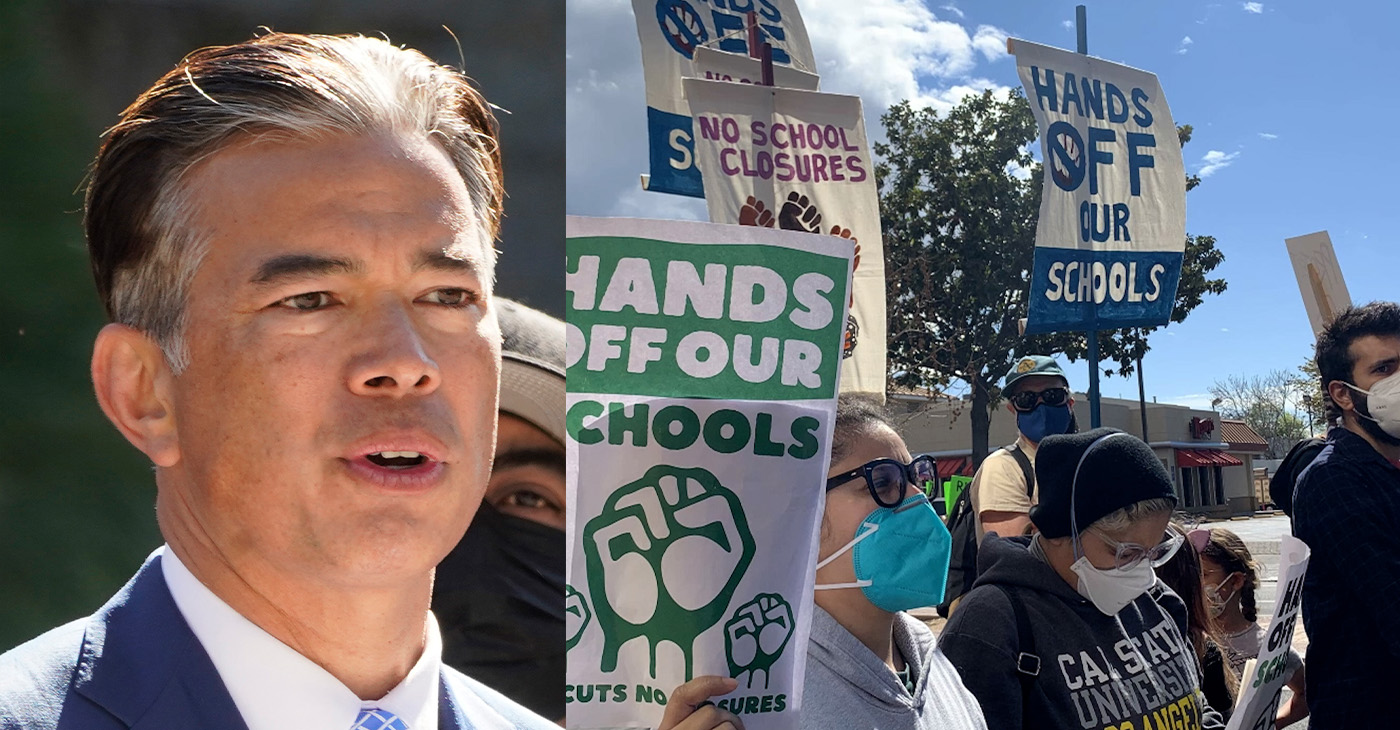
AG Bonta said DOJ investigation of 2022 closure decisions would have negatively impacted Black and low-income families.
By Post Staff
California Attorney General Rob Bonta sent a letter this week to the Oakland Unified School District (OUSD) Board of Education saying the district has a duty to comply with state education and civil rights laws to protect students and families from “disparate harm,” such as segregation and discrimination, if the district goes ahead with school closures, mergers or consolidations in 2025-2026.
The letter and an accompanying media release announced the findings of the California Department of Justice’s (DOJ) investigation into the OUSD Board’s Feb. 8, 2022, decision to close Parker Elementary, Brookfield Elementary, Carl B. Munck Elementary, Fred T. Korematsu Discovery Academy, Grass Valley Elementary, Horace Mann Elementary, and Community Day School and eliminate grades 6-8 of Hillcrest Elementary and La Escuelita Elementary.
“All school districts and their leadership have a legal obligation to protect vulnerable children and their communities from disparate harm when making school closure decisions,” said Attorney General Bonta.
“The bottom line is that discrimination in any form will not be tolerated,” he said. “I am committed to working with OUSD’s leadership to achieve successful outcomes for students.
“My office will continue to monitor OUSD’s processes and decision-making as it moves forward with the required community engagement, equity impact analysis, and planning to implement any future closures, mergers, or consolidations” to ensure compliance with California’s Constitution, AB 1912, and anti-discrimination laws.
By press time, the school district did not respond to a request for comment from OUSD.
The DOJ’s findings showed that the February 2022 decision, later partially rescinded, would have disproportionately impacted Black and low-income elementary students, as well as high-need students with disabilities, according to the media release.
The Attorney General outlined concerns about criteria OUSD has announced that it may rely on to determine future closures, mergers, and consolidations and provided recommendations to ensure OUSD does not violate state law, including prohibitions against closure decisions that reinforce school segregation or disproportionately impact any student group as required by the State Constitution, AB 1912, and anti-discrimination laws.
According to AB 1912, passed in September 2022, financially distressed school districts contemplating school closures, mergers, or consolidations must engage the community before closing schools; conduct an equity impact assessment; and provide the public with the set of criteria the district plans to utilize to make decisions.
In the letter, DOJ identified a “problematic” approach to planning for closing schools in 2025-2026 and “strongly recommends” steps OUSD should take going forward.
- “Take affirmative steps to ensure that its enrollment and attendance boundary and school closure decisions alleviate school segregation and do not create disproportionate transportation burdens for protected subgroups.”
- Don’t solely utilize criteria such as school facilities’ conditions, school operating costs, and school capacity without also including an assessment of past and present inequities in resources “due to educational segregation or other causes.”
- Some of OUSD’s proposed guidelines “may improperly penalize schools serving students with disabilities and students who have high needs.”
- The district’s decisions should also include “environmental factors, student demographics and feeder attendance patterns, transportation needs, and special programs.”
- Avoid overreliance on test scores and other quantitative data without also looking at “how each school is serving the needs of its specific student body, especially as it relates to historically marginalized communities.”
- “Engage an independent expert to facilitate community input and equity impact.”
The letter also emphasized that DOJ is willing to provide “feedback and consultation at any time during the process to ensure that OUSD’s process and outcomes are legally compliant and serve the best interests of the school community and all of its students.”
-

 Activism4 weeks ago
Activism4 weeks agoOakland Post: Week of March 20 – 26, 2024
-

 #NNPA BlackPress3 weeks ago
#NNPA BlackPress3 weeks agoCOMMENTARY: D.C. Crime Bill Fails to Address Root Causes of Violence and Incarceration
-

 #NNPA BlackPress3 weeks ago
#NNPA BlackPress3 weeks agoMayor, City Council President React to May 31 Closing of Birmingham-Southern College
-

 #NNPA BlackPress3 weeks ago
#NNPA BlackPress3 weeks agoFrom Raids to Revelations: The Dark Turn in Sean ‘Diddy’ Combs’ Saga
-

 #NNPA BlackPress3 weeks ago
#NNPA BlackPress3 weeks agoCOMMENTARY: Lady Day and The Lights!
-

 #NNPA BlackPress3 weeks ago
#NNPA BlackPress3 weeks agoBaltimore Key Bridge Catastrophe: A City’s Heartbreak and a Nation’s Alarm
-

 #NNPA BlackPress3 weeks ago
#NNPA BlackPress3 weeks agoBaltimore’s Key Bridge Struck by Ship, Collapses into Water
-

 Activism3 weeks ago
Activism3 weeks agoOakland Post: Week of March 27 – April 2, 2024



